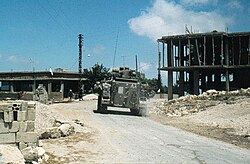| |||||
| Decades: | |||||
|---|---|---|---|---|---|
| See also: | |||||
Events in the year 1982 in Israel .
| |||||
| Decades: | |||||
|---|---|---|---|---|---|
| See also: | |||||
Events in the year 1982 in Israel .
| | This section needs expansion. You can help by adding to it. (July 2010) |

The most prominent events related to the Israeli–Palestinian conflict which occurred during 1982 include:
Notable Palestinian militant operations against Israeli targets
| | This section needs expansion. You can help by adding to it. (August 2010) |
The most prominent Palestinian terror attacks committed against Israelis during 1982 include:
Notable Israeli military operations against Palestinian militancy targets
| | This section needs expansion. You can help by adding to it. (December 2010) |
The most prominent Israeli military counter-terrorism operations (military campaigns and military operations) carried out against Palestinian militants during 1982 include:

| | This section needs expansion. You can help by adding to it. (August 2010) |

Yitzhak Rabin was an Israeli politician, statesman and general. He was the fifth prime minister of Israel, serving two terms in office, 1974–1977, and from 1992 until his assassination in 1995.

The Sabra and Shatila massacre was the 16–18 September 1982 killing of between 1,300 and 3,500 civilians—mostly Palestinians and Lebanese Shias—in the city of Beirut during the Lebanese Civil War. It was perpetrated by the Lebanese Forces, one of the main Christian militias in Lebanon, and supported by the Israel Defense Forces (IDF) that had surrounded Beirut's Sabra neighbourhood and the adjacent Shatila refugee camp.

The 1982 Lebanon War, also called the Second Israeli invasion of Lebanon, began on 6 June 1982, when Israel invaded southern Lebanon. The invasion followed a series of attacks and counter-attacks between the Palestine Liberation Organization (PLO) operating in southern Lebanon and the Israeli military, which had caused civilian casualties on both sides of the border. The Israeli military operation, codenamed Operation Peace for Galilee, was launched after gunmen from the Abu Nidal Organization attempted to assassinate Shlomo Argov, Israel's ambassador to the United Kingdom. Israeli Prime Minister Menachem Begin blamed the PLO, using the incident as a casus belli. It was the second invasion of Lebanon by Israel, following the 1978 South Lebanon conflict.

The Kataeb Party, officially the Kataeb Party – Lebanese Social Democratic Party, also known as the Phalanges, is a right-wing Christian political party in Lebanon founded by Pierre Gemayel in 1936. The party and its paramilitary wings played a major role in the Lebanese Civil War (1975–1990), opposing Palestinian insurgency in South Lebanon as well as collaborating with Israel. Pierre's youngest son Bachir, the leader of the party's militia, was elected President in 1982, but was assassinated before he could take office. He was succeeded by his older brother Amine, who led the party through much of the war. In decline in the late 1980s and 1990s, the party slowly re-emerged in the early 2000s and is currently part of the Lebanese opposition. The party currently holds 4 out of the 128 seats in the Lebanese Parliament.

Elie Hobeika was a Lebanese Maronite militia commander in the Lebanese Forces militia during the Lebanese Civil War and one of Bashir Gemayel's close confidants. After the murder of Gemayel, he gained notoriety for his direct involvement in, and overseeing of, the 1982 Sabra and Shatila massacre. Hobeika initially supported the IDF during their invasion, but later switched sides and supported the Syrians. He became president of the Lebanese Forces political party until he was ousted in 1986. He then founded the Promise Party and was elected to serve two terms in the Parliament of Lebanon. In January 2002, he was assassinated by a car bomb at his house in Beirut, shortly before he was to testify about the Sabra and Shatila massacre in a Belgian court.
The history of the Israel Defense Forces (IDF) intertwines in its early stages with history of the Haganah.

Rafael "Raful" Eitan was an Israeli general, former Chief of Staff of the Israel Defense Forces (Ramatkal) and later a politician, a Knesset member, and government minister.

Bachir Pierre Gemayel was a Lebanese militia commander who led the Lebanese Forces, the military wing of the Kataeb Party, in the Lebanese Civil War and was elected President of Lebanon in 1982.
Events in the year 1995 in Israel.
Events in the year 1987 in Israel.
Events in the year 1985 in Israel.
Events in the year 1983 in Israel.
This article outlines events which occurred in Israel in the year 1979.
Events in the year 1978 in Israel.
Events in the year 1955 in Israel.

The Israeli occupation of Southern Lebanon lasted for eighteen years, from 1982 until 2000. In June 1982, Israel invaded Lebanon in response to attacks from southern Lebanon by Palestinian militants. The Israel Defense Forces (IDF) occupied the southern half of Lebanon as far as the capital city Beirut, together with allied Maronite Christian paramilitaries involved in the Lebanese Civil War. The IDF left Beirut on 29 September 1982, but continued to occupy the country's southern half. Amid rising casualties from guerrilla attacks, the IDF withdrew south to the Awali river on 3 September 1983.

During the 1982 Lebanon War, the city of Beirut was besieged by Israel following the breakdown of the ceasefire that had been imposed by the United Nations amidst the Lebanese Civil War. Beginning in mid-June, the two-month-long siege resulted in the expulsion of the Palestinian Liberation Organization (PLO) from Beirut and the rest of Lebanon.

On 14 September 1982, a bomb was detonated during a meeting of the right-wing Christian Kataeb Party in the Beirut neighborhood of Achrafieh. Militia commander and Lebanese president-elect Bachir Gemayel and 23 other Kataeb Party politicians were killed in the blast.